There Are No Absolute Truths (Part 2)
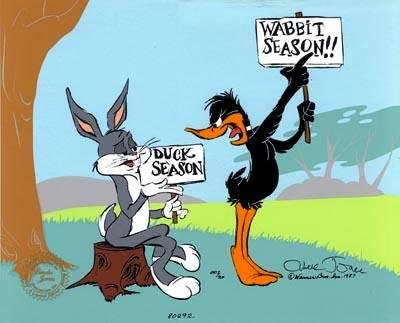
It seems that my last post about The Good Vs Evil Delusion has sparked some debate in regards to whether absolute truths exist.
I wrote another post about this a while back titled There Are No Absolute Truths so consider this post part 2. Before you jump to any conclusions about the validity of my premise (title) please read along.

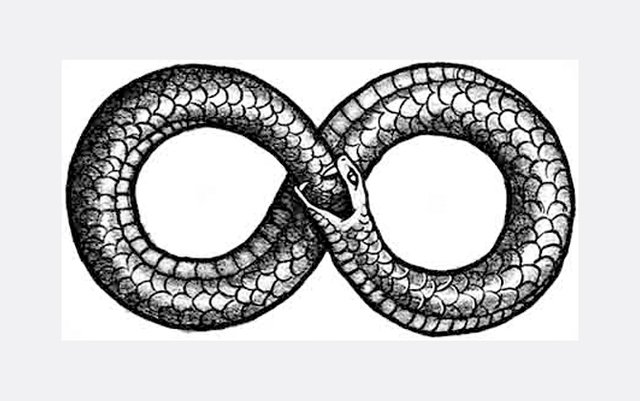
Is the Statement Self Defeating?
Many people claim that the statement "There Are No Absolute Truths" is self defeating. This is erroneous since the sentence itself implies that the author is aware that even his own statement cannot be absolute. Most people that assume that the statement is self defeating is because they believe that the author, much like them, holds the belief that absolute truth exist.I explain the concept of relativism in detail in another previous post Blind Following The blind . There, I specifically detail how he human perspective will always be limited because we are doomed to follow hollow concepts that have been passed down to us. How can we possibly assert absolute truth about anything when everything in this universe is subject to change after all?

Testing the hypothesis
There is a great video from Vsauce where the guy explains more or less how under specific rules the earth is flat. His entire process is scientific and provides substantial evidence. The point is that everything is a matter of perspective, even in science.
The human experience is inherently inadequate. The tools we have created so far in order to evaluate everything around us are based on our limited biological senses. We know this because almost all other mammals have superior senses than us. Whether our brain is "better" because we have accomplished so much more than other animals is also a matter of interpretation. The Hitchhikers Guide to the Galaxy frames this idea eloquently;
“For instance, on the planet Earth, man had always assumed that he was more intelligent than dolphins because he had achieved so much—the wheel, New York, wars and so on—whilst all the dolphins had ever done was muck about in the water having a good time. But conversely, the dolphins had always believed that they were far more intelligent than man—for precisely the same reasons.” ― Douglas Adams, The Hitchhiker's Guide to the Galaxy
What Is Absolutely True For You Is Not For Someone Else
The debates I had so far eventually brought up Hitler (as always). Besides the fact that Ad Hitlerum is a common logical fallacy, what Hitler did was not objectively immoral or false. For millions of Germans, Japanese and Italians that supported his views what he did was objectively morally justifiable. Whether one disagrees with that is irrelevant. An objective truth has to be aspired by all people that ever lived and will ever live in our species. Yes, every single one across time and space. This is what makes the truth "absolute".
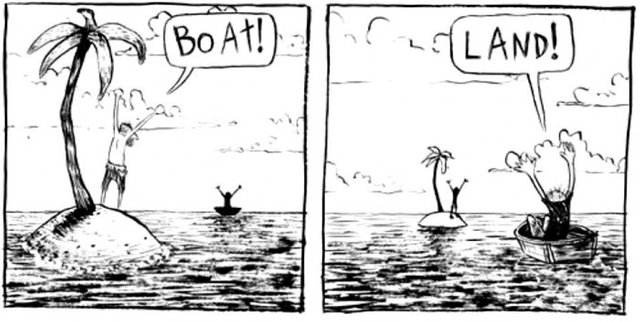
Time & Space Change Everything
300 years ago slavery was morally justifiable for just about every single human being — sometimes even slaves themselves. It was part of daily life, the status-quo if you like. Humans could be bought and sold at will. Fast forward today and almost everyone disagrees with slavery.Today we can find moral absolutists say that "Murder is Objectively Immoral". This is also false since under specific circumstances (war, mental illness, self defense) murder is very much justifiable. What is true today does not necessarily mean that it will be true tomorrow and most definitely it was not true in the past. This is how subjective our world is. Even child cannibalism cannot be justified. The Inuits of Canada, when found in harsh winters resort to eating their first born in order to survive. Their morality dictates that they can always make more babies but if they die then the entire clan suffers.
Resorting To Eschatology
When the arguments run out, the moral absolutists summon the worst case scenario (something that involves toddlers being raped by Hitler or something equivalent). Interestingly enough, the vast majority of moral absolutists are religious. This makes sense since God provides moral guidance and rather "sets the rules for others to fear". This is nonetheless a false assumption since every religion person that I have met is their own heresy (and sometimes at different times of the same day). Moreover, if one needs the wrath of God in their life in order to be a good then this defies their perspective of absolute morality.
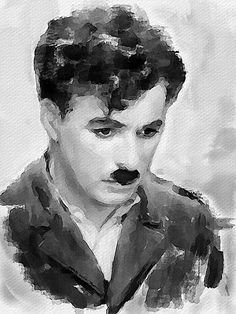
Being Humble
I assert that there are no absolute truths and I admit that this is not a statement of absolute truth. If I hear that "John is a bad guy because he is a thief" I would have to take into consideration every single parameter from John's life in order to evaluate that statement as objectively true. If I am an anarchist and find out that John was born in an abusive environment where his government stole from him (and he just happened to take back what originally belonged to him), then John, according to my subjective evaluation is not a thief. If I am a statist and hear that John is a thief because he stole something from the government, then I would assume he is a thief. A single piece of information and our own beliefs can tumble down. This is exactly why there are no absolute truths.Defeating Fear
From my debates in Steemit, I soon realized that the problem most people have is fear. Humans are afraid to live in a world where people believe in different versions of the truth. This is the same problem religions and governments have — hence why we have systems around us that everyone can follow.If you are a successful religion and/or government then after a few generations the people will believe some things as absolute truths. It all comes down to democracy after all. If a psychotic person believes in the absolute existence of a flying pink elephant and nobody else does, then we assert that he is wrong. If 1 billion believe that if they die heroically they get to be in a gang bang with 72 virgins in Paradise, then it becomes an absolute truth to them and only them.
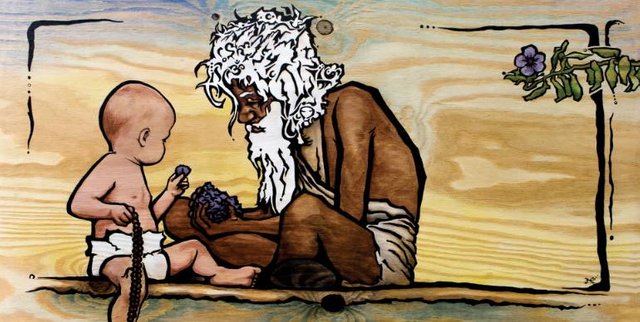
The Evidence
I challenge anyone to demonstrate a single absolute truth. That is something that can never change and is resistant to both time and space. The null hypothesis is that there are no absolute truths. It is the default position and it is justified both by natural law and rational thinking. For one to dispute this they have to demonstrate the absoluteness of their statement. As far as I am aware this is physically impossible. The universe itself is subject to change. An absolute truth can only exist if everything freezes still aka non-existence. Subjective truths is what gives rise to time and space and what sets the human experience in motion.Take a look at the image below. Every single statement you ever made, every single thought that ever passed from your mind is a conglomerate of other people's limited experiences. Much like a blind person who follows another blind person because he cannot perceive the entirety of the world around him. We cannot possibly capture all time and space. What you think you know or understand is nothing more than a meta-experience — a broken telephone game. The most self-defeating thought a person can entertain is to assume absolute truths. Sooner or later time will prove them wrong. I leave you with Richard Feynman's take on the subject.

This was very well written and thought out. Much appreciated. I enjoyed very it much. Thank you for the time, effort and more importantly the subject. Free thinking is not the norm these days IMO.
Thank you.
Except in logic and math. If you define your axioms upfront and what you describe validly derives from them, within the context of that framework your conclusions can be absolutely true.
Well yeah, but that's like saying that you are correct because you are correct.
There is nothing tautologous about logic or math. I can sort of see where you're coming from, but there's more to it than that. Meaningful truths about nature can be arrived at within those frameworks as is proved every day by physicists.
There always exists the potential that one or more of the axioms is wrong, but that does not invalidate the internal consistency of the reasoning. One way I like to express this is with the thought experiment that our universe is actually an alien's dream.
Does that invalidate all scientific knowledge? I would say that it doesn't. Our observations about how the universe behaves remain true, it's only the context that has changed: They are now observations about how the alien's dream behaves, rather than behaviors of an actual universe.
Providing those behaviors remain consistent from one moment to the next, it is possible to begin describing them and building a model. That model is nothing but a reflection of what it describes. Even if we are mistaken about the true nature of it, the description of how it behaves remains accurate.
Does this make any sense?
Ofcourse. Meaningful truths. Not absolute. Check the link about the video how one can demonstrate the earth being flat (using physics).
That's a different story but first you need to be able to falsify the premise about the alien's existence and whether or not they can dream.
Of course not. Science is the greatest tool we have. 'Perspective' is the key word here, not the validity of a premise.
Indeed. Depends on the methodology upon the model has been build. A hammer will see everything as a nail. When it comes to humans, we are bound by a teleological hell that everything exists and revolves around us. The evidence though that we have is that everything always existed and rather recycles itself. This is of course a harsh truth to digest, hence the false premises about the nature of our position in the cosmos.
That's neither logic nor math. The rest of the post seems to ignore this and go further and further from my original point. Within the framework of either logic or mathematics, operating from their axioms and according to their rules, absolute truths can be arrived at. They are the only fields where such a thing is possible.
Indeed. That's physics. Based on that kind of math you can demonstrate with absolute certainty that the earth is flat. Based on other kind of math, it is not. Hence, for the same object (earth) or observer (human or particle) the truth cannot be absolute.
I dispute your contention that physics is identical to math. I understand what you're getting at with the flat earth example but in this case feel you're forcing puzzle pieces to fit which actually don't.
The only point I hope to make here is that absolute truth is indeed possible in very narrow and contrived situations where all factors are specified by humans, such as logic and math. This is nothing to be threatened by. Even if you are committed to the view that no absolute truths exist anywhere, I advise you not to ignore these counterexamples just because they do not fit that view.
No need to force them. We can follow your 'axiom premise' and demonstrate two different truths about a single object (earth). Quantum gravity is suggested to work much the same way.
I don't argue against the tool ("math" and/or "axioms"). I argue about the observation. You can use the same axioms for measuring particle activity and still get different results because you are observing them.
Wow, I am blown away with the way you see perception in life. I agree that nothing is absolute truth, the way I live my life, most people will regard that I am wasting my time and U will suffer miserably in my future.
A lot of people think this way because I don't live according to the rules they are living. So my suffering in future is absolute truth for them. But in between, If I do something on my own to achieve what I always wanted to and become a lot more happy than I ever had been. My journey to my goals and my Path become true. And everyone will think that Whatever I have done In my life was well planned by me. So I was always right and this becomes absolute truth for them.
People's perception changes with time and things, what's wrong for someone today maybe right for them tomorrow, because situation is different now.
The thing I have learned here is that never make our opinions based on what people say. Analyze everything from all the ways we can and then decide what us true and what is wrong. After all our life depends on our perception.
Indeed. Either one keeps an open mind or their beliefs will doom them to ignorance.
Great, I will resteem it, so more people will be enlightened.
It seems like there are two competing ideas here, one is advocating moral relativism and the other advocates subjectivity. Without completely destroying the discussion, I think it is helpful to remind everyone we are using language to describe the universe. Language changes. It is vulnerable to dialect, idioms, and misunderstanding. I went to dictionary.com to try to narrow down what "absolute truth" is.
Truth: noun, plural "truths"
And now "Absolute" which is modifying the "Truth" we are discussing.
Absolute: adjective
4.free from restriction or limitation; not limited in any way: "absolute command; absolute freedom."
As we can see, even in the realm of language, there is a lot of differences in what we are talking about. In one sense, truth could mean "an obvious or accepted fact; truism; platitude" or it could mean, "honesty; integrity; truthfulness."
Since "absolute" is just modifying "truth" in this context, it would really help to know what you consider "truth" to be. You argue against "truth," saying it doesn't exist, but you never really define what it is. Since "Absolute" is modifying "truth", what specific truth are you talking about and how could it be "Absolute"? If "truth" and "absolute truth" don't exist, how are we able to use those words with any meaning? When I say, "Water (H20) can take the form of a gas, solid, or liquid," am I being untruthful? You say, "An objective truth has to be aspired by all people that ever lived and will ever live in our species. Yes, every single one across time and space. This is what makes the truth "absolute". " But if someone told me that water is only a liquid and never a gas or solid, it would do nothing to undermine the truth of my previous statement. It would just mean that they are wrong. Another helpful place to look might be the works of Derrida on deconstruction. The basic idea is that we can't know what the word "raw" means without understanding what the word "cooked" means. They are inter-related, just like a truth and a lie is. I don't mean to be rude, but the whole article breaks down into incoherence and is unintelligible without proper definitions. I understand that you can't prove a negative, but in that case you shouldn't be using the terms of the negative, or you need to redefine them. I suspect you are trying to argue for relativism on some level and against fundamentalist religious ideas, but I think you need to use different language to do.
A verifiable act or observation at given point in time.
No worries. I always enjoy a good critique. This is part 2 after all and linked other ideas. I did not want to delve with complicated philosophical concepts but rather convey the average perception of things as experienced by most people. It wouldn't matter if I define the words since most people have their own definitions.
It seems like the purpose of the article is to stir up a general conversation of the subject, even if it is incendiary. I'm curious what you would think of the quote from Mahatma Gandhi, "Even if you are a minority of one, the truth is the truth." It seems like you are putting forth your own, "verifiable act or observation," but if you don't believe truth exists or can be known, why do you care what anyone else thinks? Again, not trying to be rude, and I get that the article is meant to be provocative.
Indeed, the subjective truth.
no problem. i accept critique. harsh even. I try to get different perspectives. I don't enjoy moral absolutism.
Actually, there is not so much controversy to discuss about on this post but simply a plain mistake in insist to mix "Absolute" & "Truth" both words together into the equation for a possible, logical and coherent debate or reach eventual consensus.
Just forget about Truth or Untruth, those two words are the ones which are highly & absolutely subjective and relative to everything on this plane, dimension, frequency or whatever you want to call it... ¿reality?
My steemed @kyriacos, just leave it alone like this: there are no ABSOLUTES and that´s that! PERIOD!! ;)
This way you will not have to waste more time defending your point of view derived from the confusion by including both words together: Absolute & Truth in the same phrase. They simply are both separate entities.
Now, I agree and I'd also say; "There Are No Absolutes In This Life" Lies or Truths. Everything, absolutely everything is relative, subjective, etc, etc in relation to space-time. You simply can not trust even one of your very limited 5 senses to ensure absolutely nothing. Because your interpretation of truth, reality, etc., will never be more than your very own, personal and intimate subjective experience nourished by references previously learned, absorbed and digested, whether logical, coherent or otherwise.
Therefore my point: "There Will Never Have Absolutes In This Life" not even witnessing and watching the events live and in real time. ;)
However, to not even agree with myself and give some respite of life to this Absolute Truths apparent controversy, I will finish my comment saying: "The only absolute truth is that one of these days we are all going to die."

But in the mean time.. ¡Steem On! Cheers!! :)
spot on. I should have phrased it differently. I thought this was implied somehow.
great answer
Hehehe yes dear, using just words to phrase everything well and spit our mind out accurately on all its splendor to the general audience... It's like walking into a brothel wanting and waiting for all the females in there fall in love with you ... just for your pretty face. LoL
very well put.
Great post. It's unbelievable how many people have a hard time comprehending that the world does not revolve around their own personal values and morality just because they happened to be raised in a particular time, location, environmental influences and life conditions.
I am.
There are absolute truths.
However, if I stated them, all you would do is scoff.
And although there is tons of evidence supporting them, and no evidence against them, they are still entirely put into the area of mystical.
And then written off as things that stupid people believe, like witchcraft.
So, know that they exist.
And, as you seek, so shall yee find.
Please do so. Just state one and we can see if it holds throughout time and space and whether it has any supporting evidence for this
I am waiting for the evidence
saying so, doesn't make it so. Please try to make a proper argument.
I am not up to a debate. I am having enough troubles talking about the untruths in science, and those are just facts.
You just poo-poo'd one absolute truth, and didn't even recognize it.
So, a thing, that you probably can grock, but isn't an absolute truth, but is one from a human perspective. (as in being a human)
Killing someone hurts your soul. It may be socially acceptable or inacceptable. Good or bad. But your soul is still hurt.
If you weren't you wouldn't bother commenting. So more or less you did in order to undermine what I wrote, yet, providing no ground for your assertions.
I didn't. Whatever I say is a relative truth. That's the whole point. Even if what I am saying is relative, it doesn't make your premise absolute. It just means that it exists in a relative realm as much as mine.
It wouldn't if that someone was trying to kill your baby or if you were under drugs, or lived during the 5th century under an oppressive ruler that forced you to against him.
again. relative.
It hurts your soul. Just like a bullet hurts your body. To me it is a plain, obvious fact. I watch it happen. You can learn to see it too. It doesn't matter if you killed someone for a good reason or not. Usually a good person, defending their home, shoots a thief. These people often show emotional distress over the event. (Just one manifestation of the hurt to your soul)
As you seek, so shall yee find - is an absolute truth.
It is based on laws of the universe.
You haven't always felt this way. So either you killed someone and you feel this way now or after 100 people you might even feel better.
again. not an absolute truth.
What are you going on about?
If someone has a bullet, that went ripping through their flesh, turning them into a bloody mess, do you say, that person was not hurt by the bullet?
not if they are a masochist enjoying the pain and blood. (exception but does exist)
There are no absolute truths, there are only polarities of the same thing. We are brainswashed into thinking we should classify everything into only two categories: light - dark, good - evil, cold - warm but there's only perception, limitless perception and we should not binarize anything. Enjoy the ride.
Dear miss or sir: If "there are no absolute truths", then there exists one absolute truth, namely, the truth that "there are no absolute truths", which is self-contradictory.
Do you know what contradictory means? Here's and example: "Jane is white AND not-white." It basically is building and tearing down at the same time an idea or expressed statement. It goes nowhere. Unless you want to go nowhere, there's no point in defending contradictions.
Now there is one truth that comes out of this self contradictions, namely, "There exists at least one absolute truth". In fact, there might be more than one.
What do you think? Is 2 + 2 = 4 an absolute truth? That is, is always and everywhere and under all conditions true?
Are you a witch or wican or wizard, or satanist of some sort? I know there lot's of such folk around, and some of them may have trouble with absolute truths... just wondering.
Remember that the Eternal God who created Heaven and earth without starting from any preexisting realities is a trinity of 3 persons. I think the true God would agree with you to think in threes rather than binary patterns for things.
I don't understand how that's a validation of 2+2=5. + denotes a very narrow, specific relationship between the two terms. You can't simply substitute it for whatever else you want to put in there, as you're changing the equation. 2t2 =/= 2+2.
My point is that some people do it. Math are based on axioms (self-proof).
...what? The doesn't establish that 2 + 2 = 5. I understand math are based on axioms, but changing the axiom used changes the definition. 2 + 2 =/= 5. 2t2 may well equal 5, but that's not the same equation. One does not prove or disprove the other.
Other than demonstrating that people equivocate, I don't understand what that indicates.
The point of my argument is that people use different rules to "prove" things. That was the original point if you remember. If math were so universally accepted then most people would love them, not hate them. They are almost counter intuitive to the human perception.
Arbitrary language on the other hand...
I recall your point, but what you provided doesn't demonstrate that 2 + 2 will not always equal 4. The only possible way it could is if you accept that + has no meaning and can be substituted for anything, but this is demonstrably false. It denotes a specific relationship. If you were to change + to t without maintaining that relationship, it becomes something entirely different and has no bearing on the original expression.
What about the praxeological action axiom? Can that be falsified somehow?
https://steemit.com/onemanyproblem/@apollonius/mere-tolerance-an-answer-to-professor-dario-antiseri-s-proposal-of-moral-relativism
Very well written and thoughtful article. I think we each live in our own worlds created by many things such as backgrounds, teachings, beliefs, life experience, etc, I believe we were each created for a purpose and it is our task to find that niche.
Very well said. This is why it is important to stick to your own truths even if you are aware that might be slightly off.